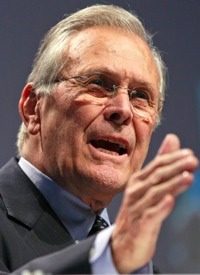
The award was presented to Rumsfeld by columnist Brad O’Leary and American Conservative Union Chairman David Keene, as well as by a surprise guest: former Vice President Dick Cheney, who oddlly received applause from the same audience that booed Rumsfeld, though some boos could be detected.
As members of the audience exhibited their opposition to Rumsfeld’s receiving the award by booing, others boldly shouted, “Where’s Bin Laden?” and called him “murderous scum” and “draft dodger.” A number of audience members championed “Ron Paul” as a worthy recipient of the award.
Eventually, Rumsfeld’s supporters countered the antagonists by chanting “U.S.A.” loud enough to drown out the dissenters.
Critics of the award’s recipient point to Rumsfeld’s defense of torture in the so-called “War on Terror,” as well as his support of the illegal imprisonment of American citizens without a trial. Additionally, those who oppose granting the award to Rumsfeld point to his gross exaggeration of Iraq’s weapons of mass destruction, as well as Rumsfeld’s linking of Iraq to al-Qaeda and to the September 11th attacks — assertions that were made or implied to drum up public support for launching an offensive war against Iraq.
The day before Rumsfeld received the award, John Birch Society President John McManus remarked:
CPAC giving a Defender of the Constitution award to Donald Rumsfeld shows how far the conservative movement has strayed from its previous principled stands. Rumsfeld is no defender of the Constitution. If he were truly a Constitution defender, he would have sought a congressional declaration of war as required by this Constitution before sending United States forces into Iraq, where they were deployed in order to enforce a United Nations security-council resolution.
When Cheney introduced Rumsfeld at CPAC, he attempted to add levity to the tense climate by referring to their 40-year-long friendship and providing a humorous anecdote about their first encounter — when the hardened Rumsfeld had no qualms about expressing his open disdain for Cheney. At the time, Cheney recalled, Rumsfeld found him to be nothing more than a “young academic,” something Rumsfeld “didn’t need.”
The interaction between Cheney and Rumsfeld on stage quickly became unabashed doting, wherein each touted the other as the greatest in history (Vice President and Defense Secretary, respectively).
Cheney touted a number of Rumsfeld’s “accomplishments,” including the fact that Rumsfeld both served as the youngest Defense Secretary in American history, in 1975, as well as the oldest, in 2001. Attempting to assuage unhappy audience members, Cheney joked, “Maybe if we give him a third term, he’ll finally get it right?”
Cheney went on to declare Rumsfeld as a defender of American exceptionalism, both at home and abroad.
When Rumsfeld accepted the award, he was met by another round of boos, but he managed to quickly win over some contentious audience members with a bit of charm and a lot of patriotism. Reminding the audience of the dedication of American troops abroad, an item that the young conservative audience did not refute, Rumsfeld pulled at the patriots’ heartstrings when he said, “I would like to share this award with the men and women of the United States armed forces. Every single one is a volunteer!”
Likewise, Rumsfeld appealed to the audience’s shared disdain for the policies of the Obama administration. He said:
Today, Americans face national reckoning. The challenges we face at home are big government, big deficits, and big spending. Left unchecked, these things can steadily erode our freedom.
Of course, he did not address the fact that American interventionism abroad — very much including our military interventions in Iraq and Afghanistan — add significantly to the U.S. government’s spending and debt sprees.
He did point to the Obama administration’s unwillingness to state that America’s enemies are radical Islamic extremists. He was cheered when he asked, “How can we defeat an enemy that we are too timid to even identify?”
Rumsfeld also aligned himself with the audience by declaring himself to be a strong proponent of limited government, strong national defense, and fiscal conservatism. In the end, however, Rumsfeld could not keep hidden the differences that separate him from the man the audience felt truly deserved the award, Ron Paul.
For example, Rumsfeld urged the audience to rethink whether the military budget should be cut, asking them to support instead small reforms like not attaching earmarks to the military budget. He asserted that Americans need a strong military and that military needs to be financially supported — while ignoring the significant cuts that could be made to the gargantuan $700 billion military budget by bringing the troops home and using them to protect the United States instead of policing the world and maintaining a global empire.
On the contrary, he discouraged the audience from succumbing to the allure of non-interventionist policies — which he called "isolationism." Contradicting the traditional American foreign policy of not becoming involved in foreign quarrels or going abroad for monsters to destroy, Rumsfeld claimed: “Isolationism is a luxury America and the world cannot afford."
Rumsfeld’s appeals to patriotism and the charm he exhibited helped him to get a standing ovation by the close of his remarks. But the audience had certainly made their point clear: The award should have gone Texas Congressman Ron Paul, the true champion of the Constitution.
Photo of Donald Rumsfeld: AP Images
Related articles:
Rumsfeld’s "Defender of the Constitution" Award Has Few Defenders
Rumsfeld to Receive "Defender of the Constitution Award" at CPAC



